Starting a SaaS project and unsure about which development framework to choose? The right framework not only reduces your time-to-market but also offers a cost-effective, secure, and scalable solution. As a SaaS development company, Belitsoft has navigated through various frameworks. We’ve compared top SaaS development frameworks, detailing their benefits, distinctive features, and use cases to guide your decision that will favor your business growth.
SaaS Boilerplate vs SaaS Framework
To build a SaaS application, you need to use a backend framework and a frontend framework at a minimum (or sometimes a full-stack framework), along with various integrations. Most often, this involves custom code.
If rapid prototyping is needed, startup founders can choose a SaaS boilerplate pre-packaged with features like user login, multi-organization support, billing, admin tools, and marketing pages.
However, ready-to-use SaaS boilerplates are not always one-size-fits-all and may lack scalability in terms of architecture. An important consideration is that to choose the right SaaS boilerplate, you first need to decide on the framework it is built upon.
Top SaaS Development Frameworks and Technologies
This post will talk about programming frameworks like Vue.js, Laravel, Angular, and others commonly used for SaaS application development. Though not exclusively for SaaS, these frameworks offer a collection of pre-built tools, libraries, and functionalities that streamline the creation of Software-as-a-Service (SaaS) applications. Using frameworks allows SaaS developers to sidestep technical tasks like server management, security, and scalability and focus on business logic and features.
Benefits of Using SaaS Frameworks
- Enhanced Code Quality. SaaS frameworks bring a host of tools and functionalities that refine the code quality, contributing to an improved SaaS development process.
- Increased Productivity. SaaS frameworks come equipped with best practices and conventions, guiding developers towards generating top-quality code. This minimizes the chances of errors and boosts the maintainability of the codebase. They also offer a range of automated tools and utilities to facilitate repetitive tasks, like testing and deployment.
- Accelerated Market Entry. SaaS development frameworks come with pre-configured modules and libraries. This allows developers to reuse code, saving time and effort in building features from the ground up.
How to Choose the Best SaaS Framework?
When choosing a software development framework, consider factors like cost-effectiveness, flexible pricing models, personalization, and automation. You should also analyze its integration capabilities and ensure it aligns with your needs.
So, what should you look for to find a suitable SaaS development framework?
- Programming Language.
Choosing a framework compatible with the programming language your team excels in is crucial. After all, the success of your application largely depends on your developers' skills.
For instance, opting for a framework that uses an unfamiliar language could slow down your team and require hiring additional developers, thus increasing expenses.
- Security and Customer Support
SaaS frameworks offer various features to safeguard data and ensure customer satisfaction. These may include data encryption, two-factor authentication, role-based access control, regular audits, penetration testing, and compliance with industry standards and regulations.
On the support side, frameworks for SaaS development may offer multiple channels of customer support, such as email, phone, or live chat, as well as self-help resources like knowledge bases or community forums.
They may also provide service level agreements (SLAs) that guarantee uptime and response times, along with continuous monitoring and alerts for potential issues.
"Security executives tend to focus on four key issues when confronting SaaS capabilities: encryption and key management, identity and access management (IAM), security monitoring, and incident response," - The McKinsey Research Agency
- Scalability and Flexibility
When developing your SaaS application, choose a flexible framework that accommodates updates and changes, keeping up with industry standards and business evolution. Remember, the chosen framework will probably be in use for five to ten years.
Considering the framework's scalability—both vertical and horizontal—is a significant factor. A flexible framework supports consistent updates and seamlessly integrates additional tools as your business grows, ensuring your software stays current and can adjust to industry shifts.
- Business Requirements
When picking the best framework for your business, focus on your specific goals rather than simply opting for a popular one. Look for frameworks for SaaS development with comprehensive libraries and databases that align with your project's needs—these features can significantly influence your technology stack selection.
- SaaS Application Development Cost
In the process of choosing a SaaS development framework, you must consider your budget. Always operate within your company's financial constraints. Don't just consider the cost of a platform, but also the functionality it provides. This balanced approach can help businesses save money while still achieving high-quality results.
Top SaaS Development Frameworks
React
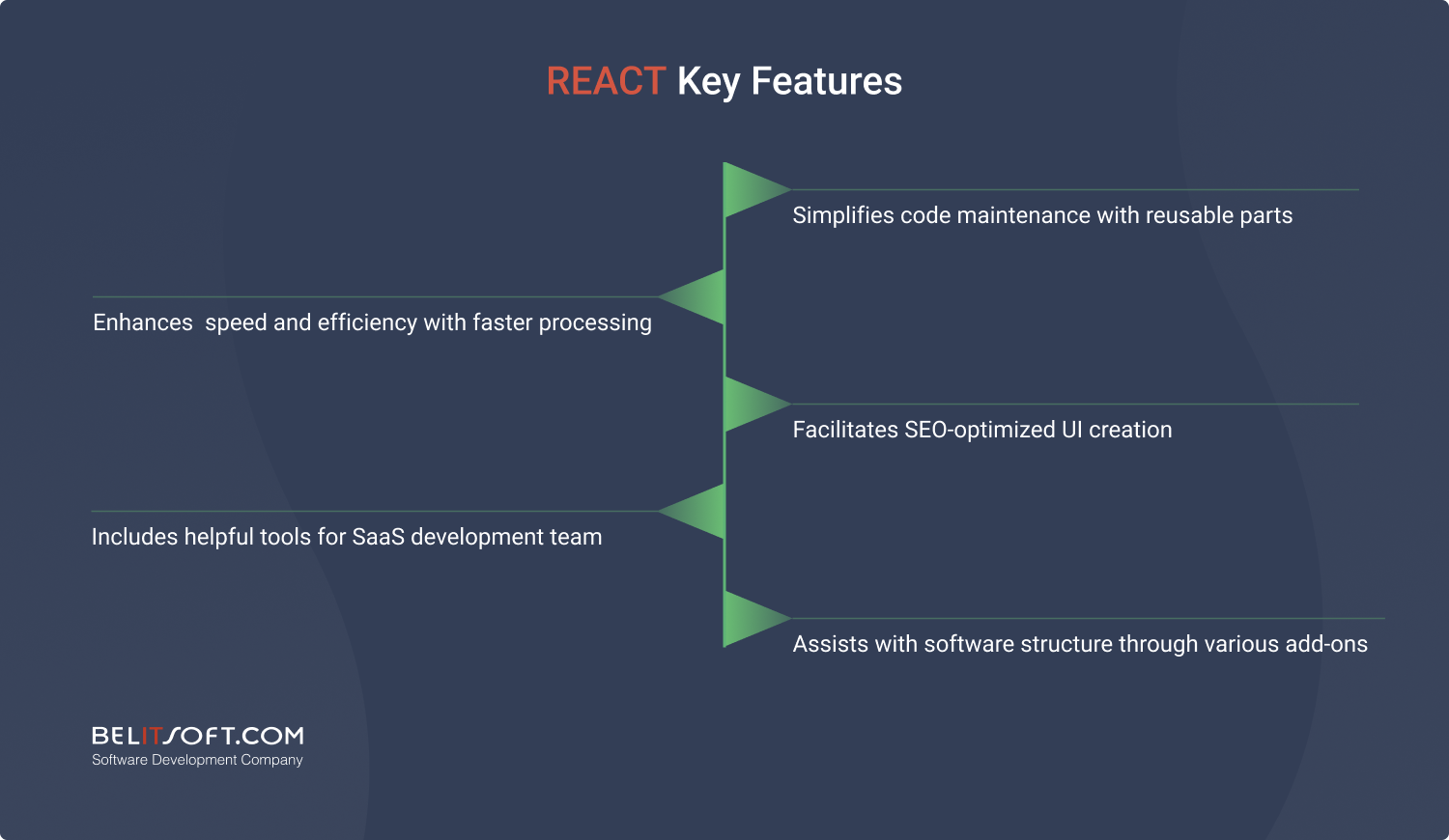
Meta created React, a front-end JavaScript library, to improve UI/UX for web and mobile SaaS applications. Developers typically use React to build large, scalable web applications.
React simplifies web page manipulation with its Virtual DOM, enhancing overall interface interactions. It primarily aims at providing scalability and flexibility.
With its ability to deliver an exceptional user experience, React has secured a place in popular social media platforms like Instagram and Facebook, as well as video streaming services, including Netflix.
React Features:
- Allows for easy code maintenance due to many reusable parts
- Enhances overall speed and efficiency of displaying visual content with quicker processing
- Facilitates the creation of search engine-optimized user interfaces
- Provides a set of helpful tools. For instance, a React-based framework Next.js features out-of-the-box Server-Side Rendering (SSR)
"Building a Netflix TV UI experience that can run on the variety of devices we support is a fun challenge. In 2015, we embarked on a wholesale rewrite and modernization of our TV UI architecture. We decided to use React because its one-way data flow and declarative approach to UI development make it easier to reason about our app," - The Netflix Tech Blog
Vue.js
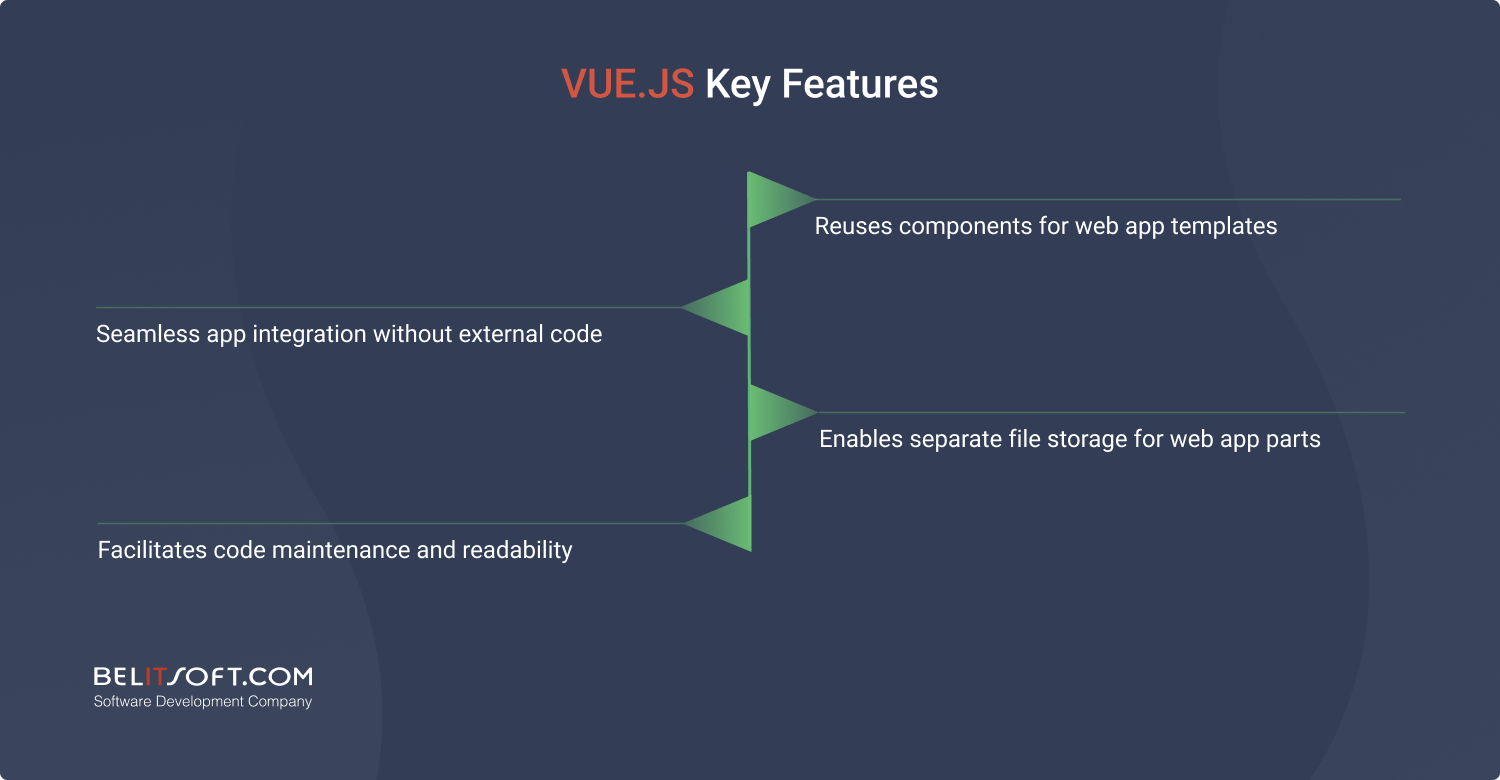
Vue.js is a versatile web development framework that enables developers to create large-scale applications using JavaScript. It's earned popularity for its possibility to integrate into web apps as well as its simplicity and accessibility for web developers.
From team collaboration apps and trading platforms to the renowned cloud-based typing assistant Grammarly, Vue.js has been the building block for many robust applications.
Vue.js Features:
- Enables reusing various components to build templates for web applications
- Integrates directly into the app without requiring additional external code
- Allows users to store each component of a web application in a separate file
- Enhances code maintenance and readability
Angular
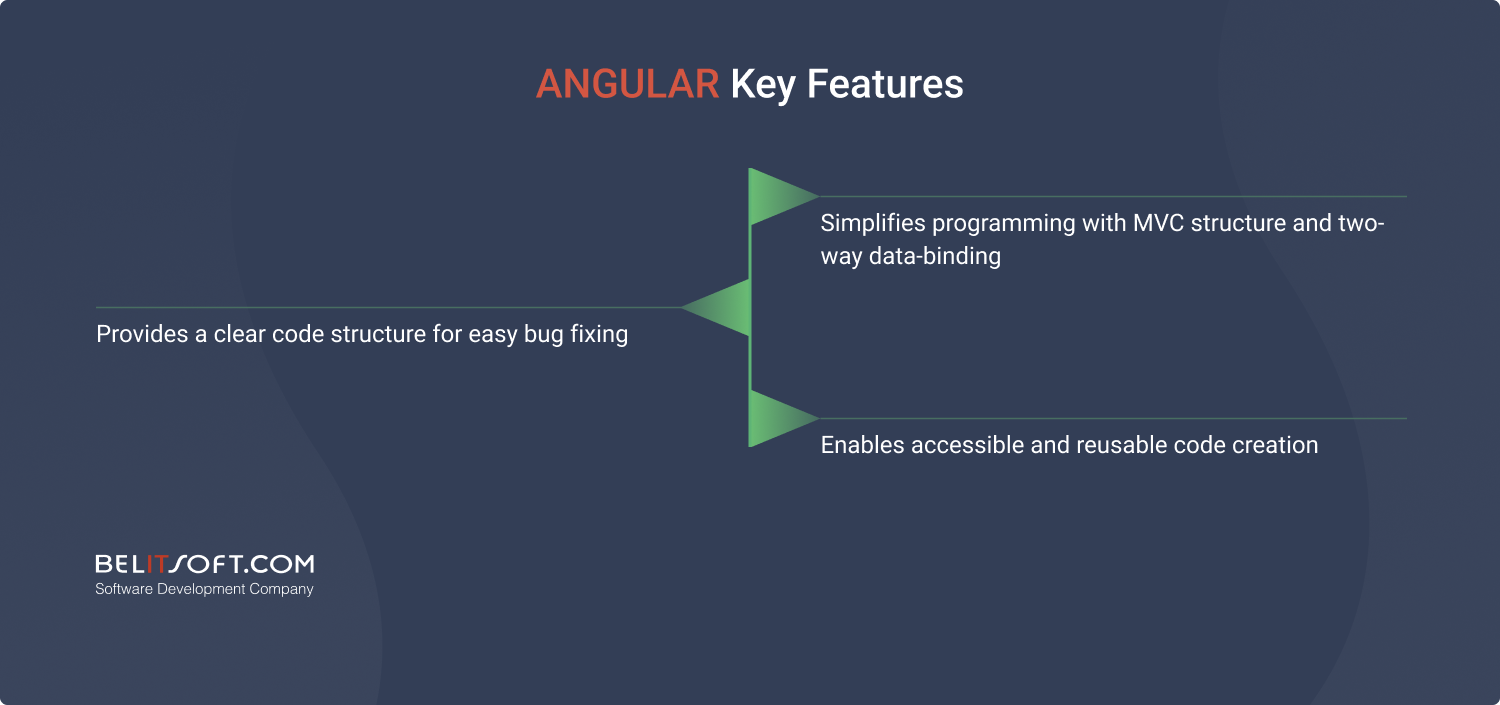
Angular, a free framework created by Google for front-end software development, empowers developers to build large-scale SaaS applications. It comes with built-in tools for a highly secure framework and enables two-way data binding, saving time and streamlining the web development process. Alongside CSS and HTML, Angular employs Typescript, a programming language designed to maintain consistent code.
Angular boasts an array of powerful tools for SaaS application development, including HTML, CSS, Typescript, Karma, Mocha, and Visual Studio. These resources heighten the efficiency of the web development process and simplify program compilation.
Angular is often the go-to choice for companies looking to handle high loads seamlessly and securely, all while delivering an attractive user interface. Its widespread appeal spans various industries, with notable users including JetBlue Airways in the travel sector, job search platforms such as Upwork, and digital wallets.
Angular Features:
- Simplifies programming with a complete MVC structure and two-way data binding
- Offers a clear and organized coding structure for easy bug detection and error correction
- Allows developers to create reusable, easily accessible codes
Node.js

Node.js is an excellent framework for developing network applications or systems that demand speed and scalability. It's useful for processing and consuming real-time data in multi-user scenarios.
Node.js employs the "Single Threaded Event Loop" architecture, allowing it to handle numerous clients simultaneously. This approach enables faster task completion while using fewer threads and conserving memory.
Node.js Features:
- Offers rapid scalability
- Contains built-in clustering
- Ranks among the fastest solutions due to its non-blocking input-output procedures
- Facilitates easy integration into full-stack development using JavaScript
- Provides architectural flexibility, allowing changes in one node without disrupting the entire system
- Supports cross-platform development
Laravel

Laravel, a free and open-source framework built with PHP, has been employed in creating of over 140,000 websites and 98,260 domains. Adhering to the MVC structure, it boasts a wide array of templates and web applications crafted with PHP.
As a reliable and advanced framework, Laravel is an ideal choice for startups and new businesses. It streamlines data access and manipulation for developers through object-relational mapping (ORM) and offers a vast library of pre-built functionalities and cutting-edge tools to expedite the SaaS development process.
Common applications of Laravel include financial and billing portals, loan marketplaces, and sports collaboration platforms.
Laravel Features:
- Offers simple pre-designed structures for creating layouts with dynamic content seeding
- Enhances control entry and authorization logic across various resources
- Automates repetitive tasks using the command-line tool, Artisan
- Connects to existing sessions and caches using Redis
- Includes libraries written with object-oriented programming techniques
Symfony
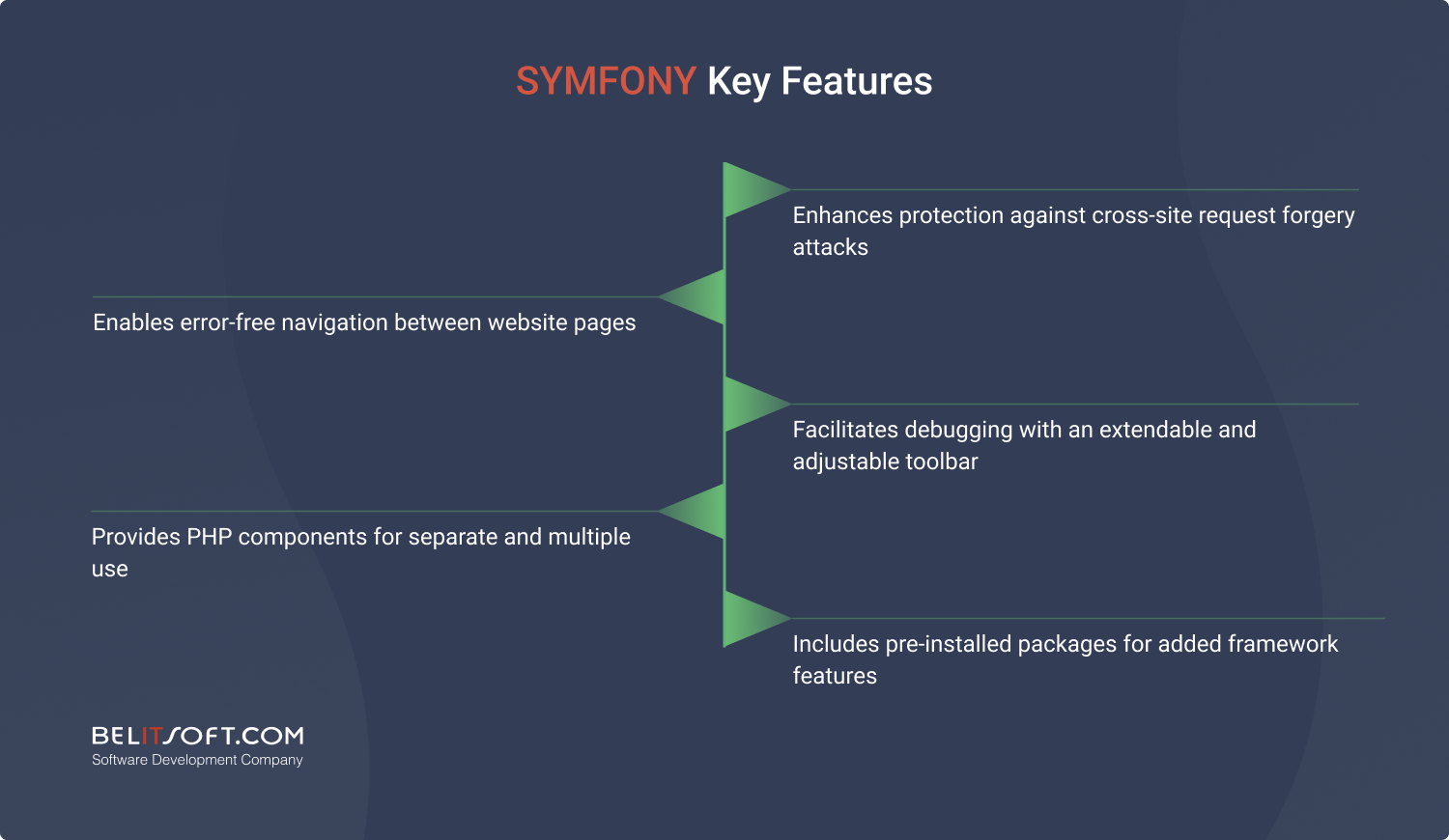
Symfony, a SaaS development framework employed by nearly 600,000 developers across 100 countries, provides a robust architecture for crafting SaaS applications.
This popular framework comes with a comprehensive suite of features, including templates, ORM, multiple libraries, data security, and unified modules. Its clean code, structured layout, and adherence to best programming practices distinguish it as a preferred choice for efficient SaaS development.
You can seamlessly integrate Symfony with an independent library and PHP Unit. Plus, it's the go-to component source for many open-source SaaS projects like Drupal, phpBB, and Composer.
From powering eCommerce platforms and media services to facilitating travel industry operations and Content Management Systems, Symfony's versatility shines in a variety of use cases.
Symfony Features:
- Ensures better protection against cross-site request forgery attacks
- Facilitates navigation between website pages without errors or complications
- Makes debugging easier thanks to an extendable and adjustable toolbar
- Provides PHP components that can be used multiple times and separately
- Comes with pre-installed packages that add more features to the framework
Django
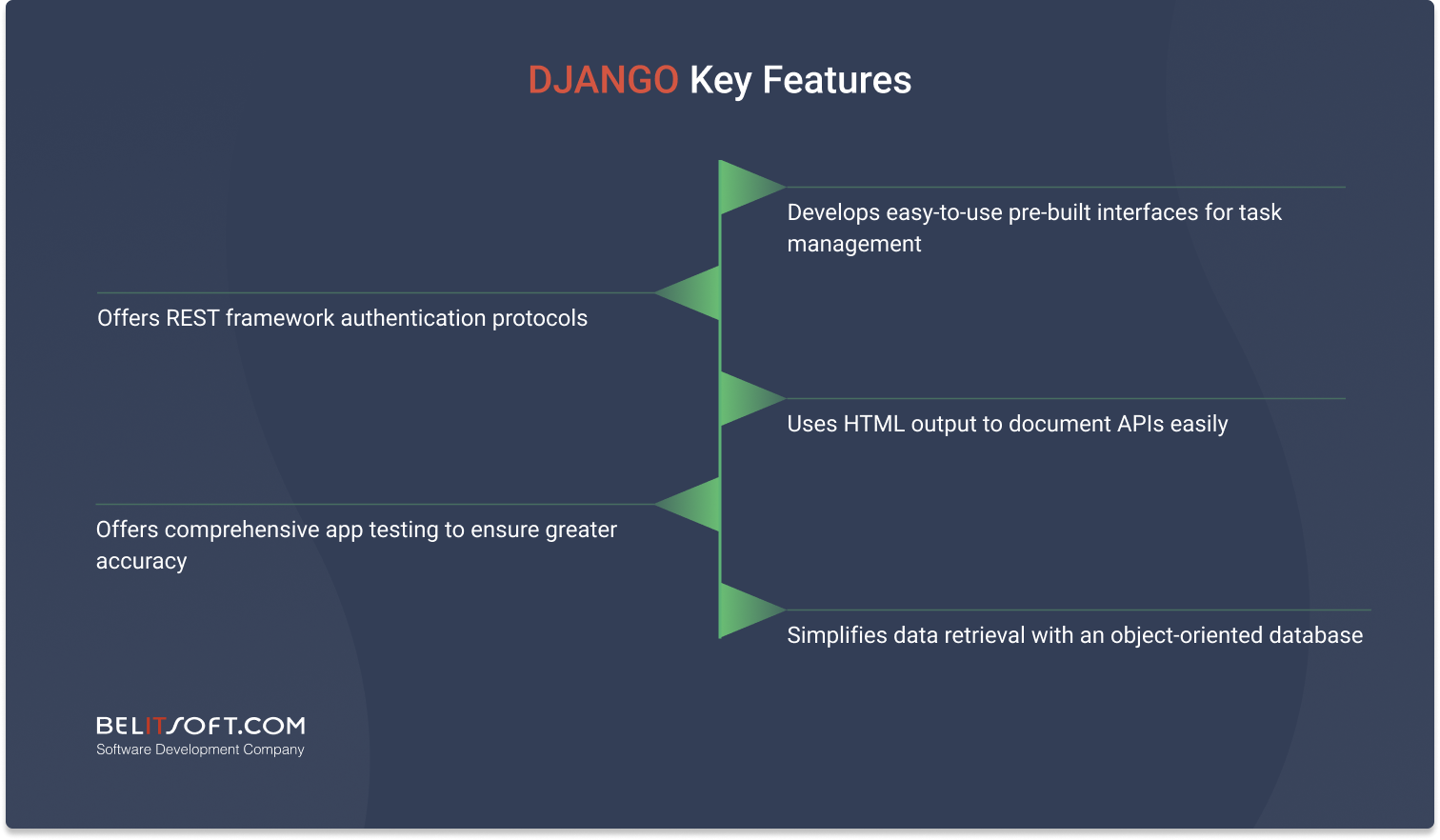
Django, a high-level Python web framework, empowers developers to swiftly build robust SaaS products. With a track record of over 80,000 websites to its name, Django excels in creating complex, data-driven websites and the front-end development of top-notch web and Android apps.
Its practical, SaaS-enabled product design expedites development, saving valuable time. From Content Management Systems to event management platforms and web browsers, Django's versatility and efficiency make it a preferred choice across various industries.
Django Features:
- Facilitates the creation of pre-built, user-friendly interfaces for task management
- Offers robust authentication protocols through the REST framework
- Utilizes HTML output for effortless API documentation
- Provides comprehensive app testing for enhanced accuracy
- Promotes simpler data retrieval with an object-oriented database
With the right framework, you can create scalable, reliable, and cost-effective software that meets your customers' needs and drives your business growth. Let professionals help you select the best framework to create a lucrative product.
Frequently Asked Questions
SaaS (Software as a Service) development refers to the process of crafting web-based software applications provided to customers as a service.
In this model, the software is hosted and meticulously maintained by a third-party provider, allowing customers to access it seamlessly through a web browser or mobile app. This eliminates the hassles of installing, maintaining, and updating the software on individual devices, providing a streamlined user experience.
SaaS development is frequently employed for business applications such as Customer Relationship Management (CRM), Human Resources Management (HRM), and Enterprise Resource Planning (ERP) systems, providing robust and versatile solutions for diverse business needs.
To successfully build a SaaS application, there are seven critical steps to consider:
- Conduct a thorough market analysis to gain comprehensive insights into your target audience and their specific needs.
- Test your hypotheses to ensure that your SaaS application idea is not only innovative but also viable.
- Validate whether users are willing to pay for the product or service you're planning to offer, ensuring it has a market.
- Select the most suitable monetization model that aligns with your business goals and customer expectations.
- Define the technology stack you'll use to construct and deliver your high-quality SaaS application.
- Develop a Minimum Viable Product (MVP) to test your idea with real customers and collect valuable feedback.
- Continuously test, iterate, and improve your SaaS application based on user feedback, all while maintaining and developing the product over time.
SaaS offers a multitude of benefits to businesses.
- It significantly lowers the upfront costs compared to traditional commercial software.
- It eliminates the need to install software on individual machines, thus saving valuable time and resources.
- Moreover, SaaS gives businesses the flexibility to scale services in line with their growth.
- It can be integrated with other software systems, enhancing overall functionality.
- Plus, SaaS ensures instant updates for all users, guaranteeing everyone has access to the latest features and improvements, among many other advantages.
Rate this article
Recommended posts
Our Clients' Feedback


















.jpg)
.jpg)
.jpg)
.jpg)
.jpg)
.jpg)
.jpg)
.jpg)
.jpg)
.jpg)
.png)
.png)
.png)
.jpg)
.png)
















We have been working for over 10 years and they have become our long-term technology partner. Any software development, programming, or design needs we have had, Belitsoft company has always been able to handle this for us.
Founder from ZensAI (Microsoft)/ formerly Elearningforce